On July 20th, the 6th Academic Journal History Editors’ Forum on "Building a High-quality Academic Journal with a Global Perspective" was held in Changchun, which was sponsored by the National Research Association of Liberal Arts Journals of Colleges and Universities, and hosted by the School of History and Culture of Northeast Normal University, the Editorial Department of Foreign Studies and the Editorial Department of Journal of Northeast Normal University (Philosophy and Social Sciences Edition).
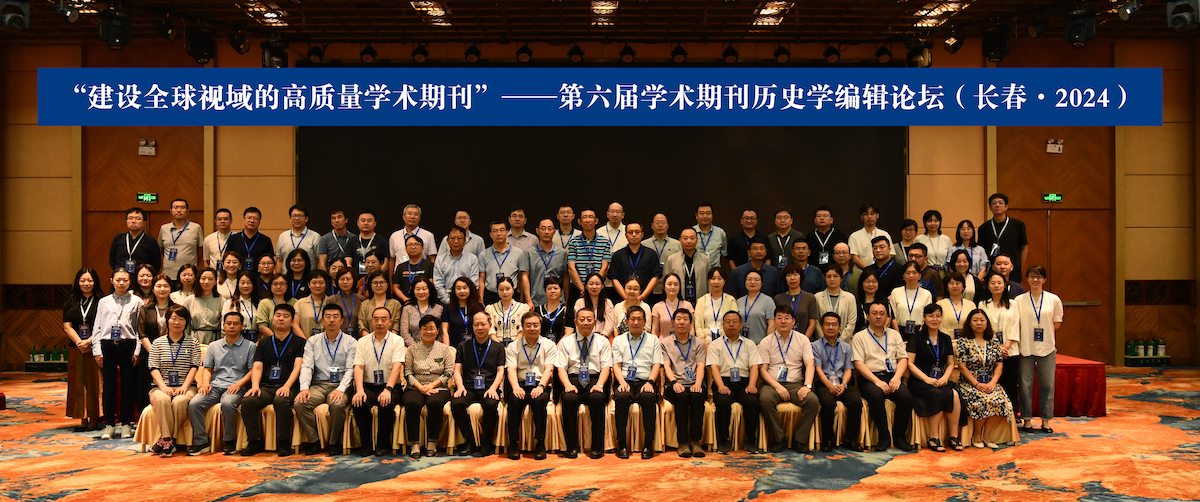
take a group photo
Professor Guo Jiahong, vice chairman of the National Research Association of University Journals of Liberal Arts, executive editor of Journal of Beijing Normal University (Social Science Edition), Liu Wenshan, vice chairman of the National Research Association of University Journals of Liberal Arts, editor and editor, and Professor Zhong Weimin, vice chairman of the National Research Association of University Journals of Liberal Arts and executive deputy editor of Journal of Tsinghua University (Philosophy and Social Science Edition), Researcher Xu Zairong, deputy editor-in-chief and editorial director of World History, Professor Miao Shumei, editor-in-chief of History Monthly, Professor Fu Haiyan, editor-in-chief of Journal of Central China Normal University (Humanities and Social Sciences Edition), researcher Xu Zhimin, deputy editor-in-chief and editorial director of Historical Theory Research, professor Feng Lijun, editor-in-chief of Journal of Shaanxi Normal University (Philosophy and Social Sciences Edition), and Journal of Anhui University (Philosophy and Social Sciences Edition) Professor Ma Linghe, executive editor of Journal of Anhui Normal University (Social Science Edition), Professor Chen Liang, vice president of the School of History of Nanjing University, Zhao Ziyuan, deputy editor-in-chief of Tianjin Ancient Books Publishing House, researcher Xu Tao, director of the editorial department of Shilin, deputy editor-in-chief of Liu Qingtao, deputy editor-in-chief of the editorial department of Research on History and Geography of China’s Frontier, deputy editor-in-chief of organ of Journal of Peking University (Philosophy and Social Science Edition) and responsible editor of Journal of Tsinghua University (Philosophy and Social Science Edition). Researcher Li Liu, deputy editor-in-chief of social science front, Professor Li Yueqin, deputy editor-in-chief of History Teaching, Associate Professor Li Jing, deputy dean of School of History and Culture of Southwest University (in charge of Western History), and Professor Yan Wei, executive editor of Middle East Studies,Professor Qi Yan, director of the history department of Heilongjiang University and editor of Qiushi Journal, Professor Zhang Qiang, editor-in-chief of Ancient Civilization, Professor Guo Dantong, deputy editor-in-chief of Foreign Studies, and more than 60 experts, scholars and journal editors from dozens of journals all over the country attended the meeting. Wang Yan, deputy secretary of the Party Committee of Northeast Normal University, and Professor Bai Weichun, member of the Standing Committee of the Party Committee of Northeast Normal University and editor-in-chief of Journal of Northeast Normal University (Philosophy and Social Sciences Edition), attended the meeting. The opening ceremony of the conference was presided over by Professor Dong Haozhi, Dean of the School of History and Culture of Northeast Normal University and executive deputy editor of Foreign Studies.
In his speech, Wang Yan extended a warm welcome to the experts and scholars attending the meeting. He said that Northeast Normal University attaches great importance to the construction of history disciplines and the development of academic journals, with nearly 20 journals covering many disciplines. As a first-class leading discipline in the field of philosophy and social sciences, the history of East Normal University has also given full play to its disciplinary characteristics, insisted on being upright and innovative, and initiated "academic frontier defense" in the whole country with the help of geographical advantages, with the help of three core historical journals, namely, Studies on Foreign Issues and Ancient Civilization, in order to provide academic and intellectual support for the needs of national culture and diplomatic strategy. In the future, Northeast Normal University and East Normal University will continue to improve the quality of journals, serve academic research and discipline construction, and contribute wisdom and strength to the prosperity and development of China’s journals.
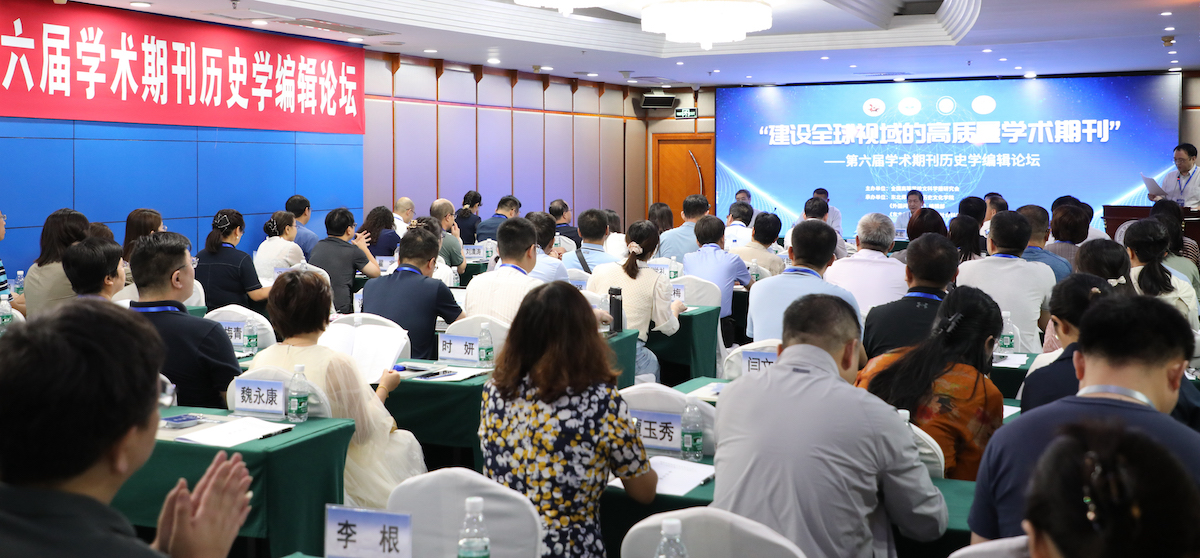
The main venue
Guo Jiahong pointed out that leading innovation is the mission of academic journals, and the editorial team is the core of journal construction. At present, academic journals have ushered in a golden age, and it is the top priority to convene journal editors to carry out academic dialogue and organize experience exchange to create high-quality journals. As an important carrier and exhibition platform of high-level research achievements in history, academic journals are facing the challenges of globalization and digitalization. He emphasized that academic journals should not only improve their political position, but also adhere to the people-centered academic value position and publication construction direction, give full play to their academic service capabilities, and push China’s historical research to the world. Subsequently, he gave a brief report on the recent work of the research society of liberal arts journals in colleges and universities around the key points of periodical quality inspection and evaluation, young editors’ business skills competition, excellent editors’ selection activities and editing skills training.
Bai Weichun pointed out that the Party Committee of Northeast Normal University attached great importance to the construction of academic journals of liberal arts, and set the objectives and related strategies for spreading China’s academic discourse and prospering and developing China’s philosophy and social sciences. For a long time, Journal of Northeast Normal University (Philosophy and Social Sciences Edition) has always focused on high-quality development and carried out its work with the concept of serving schools, disciplines, academics and scholars. The history of East Normal University is profound and influential. Journal of Northeast Normal University (Philosophy and Social Sciences Edition) also insists on doing a good job in the history column as an important task in the publication construction. It works closely with the School of History and Culture, adheres to the leading-edge problem orientation, and makes contributions in a column style, making lasting efforts for the development of the history discipline. Finally, he invited the scholars present to put forward valuable opinions on the development of the journal of liberal arts in Northeast Normal University, and hoped to continue to communicate and cooperate with experts in the future work.
The keynote speech session was hosted by Li Yueqin. Miao Shumei gave a report entitled "Young Talents Training and Academic Mission of Journals —— Taking History Monthly as an Example". She pointed out that cultivating young talents has always been one of the basic purposes of History Monthly. Since its publication, the publication of History Monthly has always focused on young historians, attaching importance to and supporting young people to publish research results. In the subsequent development, Historical Monthly still adheres to the principle of cultivating new people’s sense of responsibility, adhering to the principle of "undifferentiated quality first", cultivating new historians with a tolerant attitude and a developmental vision, and discovering new historians, which has won unanimous praise from historical predecessors and won the broad trust of the younger generation. In addition, she introduced the situation of youth forum jointly organized by History Monthly and other academic institutions, and said that she would continue to undertake the academic mission of cultivating successors in the field of history in the future.
Fu Haiyan, with the topic "Difficulties and Challenges Faced by the Historical Column of University Journals under the New Situation", discussed that compared with professional journals, the historical column of university journals has some shortcomings in the richness of manuscripts, the amount of manuscripts published and the academic influence. Secondly, he emphasized that comprehensive journals are caught in the double structural dilemma of periodical evaluation system and academic evaluation system. Although journals strive to coordinate the layout resources of literature and history with other categories and the publishing opportunities of senior scholars and young talents, the balance between them is still difficult to grasp. At the same time, Fu Haiyan put forward the idea of establishing a community of historical editors, and responded to the current predicament by ensuring the number of columns, improving the quality of column papers, and giving full play to the characteristics of column styles. Then, he called for the support of evaluation institutions, hoping to realize the synergy and interaction among journals, evaluation institutions and the community, and jointly promote the construction and development of historical columns in journals of major universities.
Xu Zairong gave a report on the topic "The Interaction between Editors and Authors in the Construction of Professional Academic Journals —— Taking World History as an Example". Based on his own experience in running journals, he emphasized the subjectivity of editors and pointed out that the role of editors is changing from providing editing and proofreading services to actively participating in the production and dissemination of academic knowledge. Facing the new academic ecology, journals need to strengthen topic planning, organize dynamic columns and written talks, actively build academic exchange platforms, and promote the growth of young and middle-aged scholars. In addition, he also shared various measures implemented by the editorial department of World History, and proposed that only by ensuring the standardization and self-discipline of editing work with rules and regulations can the journal continuously improve its academic quality and influence. He emphasized that the editor’s shift to the subjective role does not mean the weakening of its service, but aims to interact with the author more actively in his work, and the two sides work together to achieve academic innovation.
Ma Linghe published it with the title of "Some Opinions on the Construction of Economic History Columns". He pointed out that although economic history is an important part of historical research, it is currently faced with the dilemma that professional journals are scarce and column characteristics are difficult to achieve. Combined with personal experience, he pointed out the problems faced by economic history columns, such as cross-domain manuscript sources, fragmentation of research, poor readability of articles, and called on journals to play an academic leading role, publish guiding manuscripts, guide academic circles to pay attention to emerging trends, expand the perspective of investigation, build a theoretical framework, and carry out logical analysis to avoid data stacking. He believes that the study of economic history should attach importance to comparative study and international perspective, form its own discourse and narrative, and thus promote the study of Chinese economic history to the world. Ma Linghe said that the role of journals is to lead and proofread. He expected that with the joint efforts of journals and scholars, the field of economic history could break through the bottleneck, get out of the predicament and create a new pattern of discipline development.
Chen Liang published a report entitled "Introduction of Digital Technology and Innovation of Historical Research", which discussed the historical editors’ examination of digital humanities and the problems faced by traditional historiography under the background of digitalization. He first pointed out that history, as the foundation of liberal arts, is unique in the dialogue between disciplines and different in methodology. Subsequently, based on the assertion that "history is evergreen", he analyzed the opportunities brought by digital technologies such as text mining, foreign language translation assistance, database scanning and intelligent retrieval to historical research, and also emphasized that technology should serve historical issues rather than replace historical research itself, and enumerated the limitations of artificial intelligence in material collection and reading through vivid examples. Finally, Chen Liang called on historical editors to be vigilant in the digital age, to adapt to technological progress while ensuring the quality and academic value of published articles, and to use new technologies to enhance editorial efficiency and publication influence.
Xu Tao’s report is entitled "Shi Lin and the Exploration of the Construction of the Three Systems of History Discipline". He emphasized that history occupies a unique position in both theory and reality. Based on this, history editors should act positively and be brave in innovation. Later, he reviewed his specific work as an editor, shared the universal experience and representative problems in the construction of historical journals, and especially talked about the persistence and breakthrough in the predicament of tight financial support and lack of professional team when Shilin was first created. Then, he concisely summarized the concept of "change and invariability" in running a journal, and emphasized that while adhering to China’s position, it is necessary to keep up with the pace of the times, flexibly coordinate the proportion of disciplines at all levels of history, and set topics that are close to the pulse of the times. In addition, he also advocated that editors should hold interdisciplinary, cross-industry and full-coverage seminars, invite researchers and evaluation system personnel to participate together, and work together to promote the in-depth development of the three major systems of history.
The meeting has two sub-venues, with a total of four group discussions.
The first session of the first session was presided over by Qin Weibo, managing editor of Journal of Northeast Normal University (Philosophy and Social Sciences Edition), Qi Yan, historical editor of Qiushi Journal, Zhang Dengde, deputy editor of Journal of Shandong Normal University (Social Sciences Edition), Yan Wei, executive editor of Middle East Studies, Feng Lijun, editor of Journal of Shaanxi Normal University (Philosophy and Social Sciences Edition), and Zhao, deputy editor of Tianjin Ancient Books Publishing House. Wen Fangfang, editor in charge of Journal of Tsinghua University (Philosophy and Social Sciences Edition), Wang Xueli, editor of Journal of Jilin University Social Sciences, Jane Meiqing, editor of Journal of Anhui University (Philosophy and Social Sciences Edition), Tiantian Wang, editor of History Teaching, Liu Yi, deputy editor of Regional Culture Research, editor of Journal of Hebei Normal University, and Zhang Angxiao, director of China History Teaching and Research Office of Hebei Normal University School of History and Culture, participated in the discussion. In today’s academic environment, academic journals are facing many challenges, such as the difficulty of soliciting manuscripts, the uneven quality of manuscripts and the complex evaluation system, which makes a universal anxiety spread among editors. New problems need new responses, and new requirements bring new standards. Focusing on "the challenge and accomplishment of historical editors", editors share their own experiences and point out that historical editors are gradually moving closer to "scholar editors", which requires not only accumulating profound historical professional knowledge, but also consciously exercising academic insight and professional skills. At the meeting, editors explored the new path of industry development through discussion, so as to better cope with the complex and changeable academic environment and provide help for the development of history.
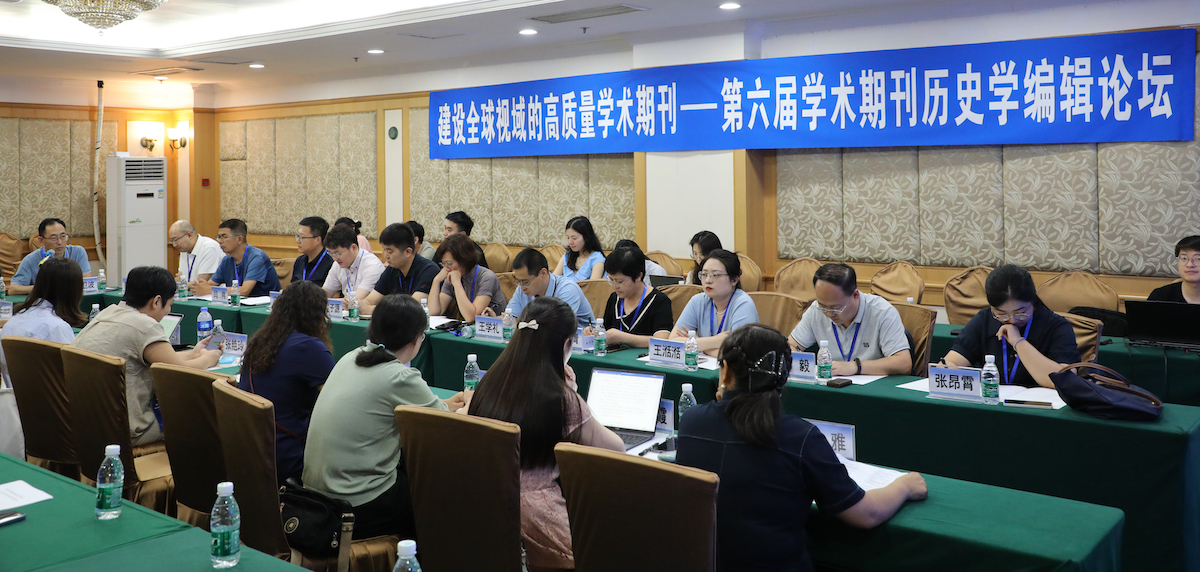
The first branch meeting place
The second unit of the first session was presided over by Guan Qin, deputy editor of Journal of Peking University (Philosophy and Social Sciences Edition). Zhang Zhidong, editor-in-chief of Journal of Anhui University (Philosophy and Social Sciences Edition), Bai Xiaoguang, editor-in-chief of Siberian Studies, Li Yueqin, deputy editor-in-chief of History Teaching, Li Jing, vice president of School of History and Culture of Southwest University, Li Xiaoyang, editor of Central Plains Cultural Studies, Zhang Yanling, deputy editor-in-chief of Journal of Shaanxi Normal University, Li Liu, deputy editor-in-chief of social science front, Zhang Xiuli, deputy editor-in-chief of History Monthly, Du Ping, deputy editor of Journal of Capital Normal University (Social Science Edition), Liang Xia, executive deputy editor of Journal of Qinghai Normal University (Philosophy and Social Science Edition) and Feng Ya, deputy editor of Journal of Northeast Normal University (Philosophy and Social Science Edition) participated in the discussion. This report focuses on "the shaping and selection of periodical style", and participants deeply exchanged their efforts in creating periodical style. Editors mostly rely on local cultural resources with local characteristics and dominant disciplines in universities to carry out thematic planning and the establishment of expert database, so as to attract high-quality manuscripts and promote the benign interaction between academic journals and disciplines. However, some experts also stressed that besides making use of the surrounding resources, the modeling of periodical style should be problem-oriented, and the columns should be adjusted and reconstructed to realize global dialogue, so as to realize the long-term development of periodicals and promote the deepening and wide dissemination of academic research.
The first unit of the second session was presided over by Xu Zhimin, deputy editor-in-chief and director of the editorial department of Historical Theory Research. Liu Qingtao, deputy director of editorial department of History and Geography of China’s Frontier; Yuan Hao, editor-in-chief of Journal of Daqing Normal University; Zheng Binbin, editor of Medical Social History Research; Zheng Guangchao, editor of History Collection; Wang Yuhai, editor of Shanghai Culture Publishing House; Zhao Guangjun, deputy editor-in-chief of History Monthly; Liu Jingyu, professor of East Asia Center of Beihua University; Zhai Yu, associate researcher of Guizhou Social Science; and deputy director of Social Science Research. During the meeting, editors, based on their own experience in reading manuscripts, held a heated discussion mainly around "Reconstruction and innovation of historical norms in the new era" and conducted in-depth exchanges on core issues such as writing norms of historical papers and construction of discourse system. The meeting pointed out that historical research in the era of globalization has ushered in new opportunities, which requires historians to pay attention to the integration of disciplines, cultivate a macro-thinking and analytical framework, and promote China’s historical discourse system to closely link with the theme of the times and respond to questions raised by international academic circles while maintaining its autonomy. In addition, the conference also advocated the use of social media to broaden the dissemination channels of academic achievements, enhance their social influence, and inject new vitality into the field of history.
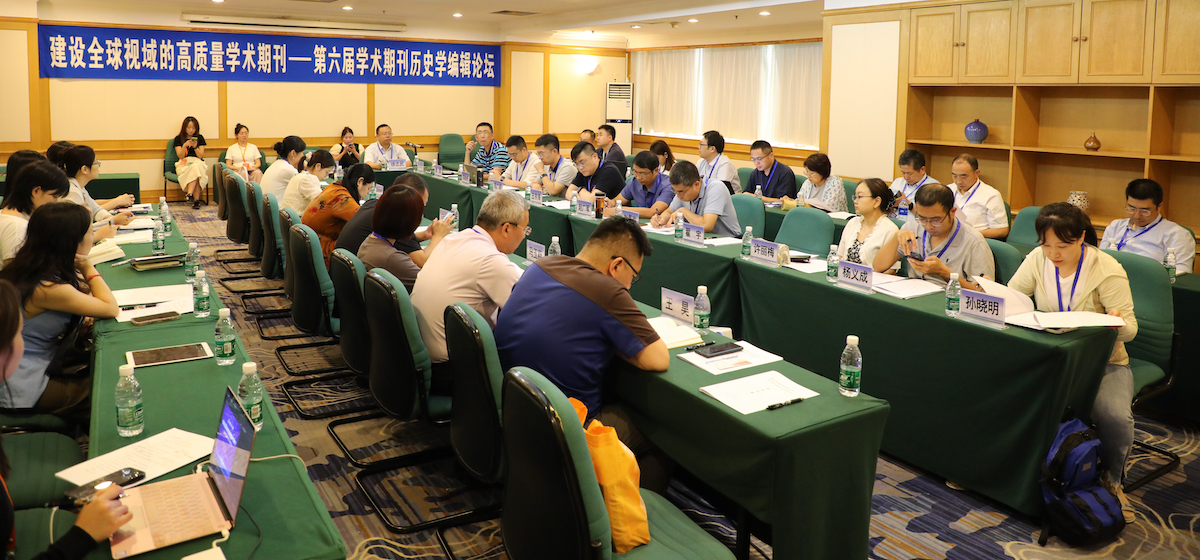
The second branch meeting place
The second session of the second session was presided over by Xiao Haiyan, deputy editor of Journal of Central China Normal University (Humanities and Social Sciences Edition), Zhu Yiqing, editor of Folk Studies, Qiao Yu, associate professor of the School of History of Capital Normal University, editor of Global History Review, Chen Yingxue, associate professor of Peking University History Department and editor of Western Studies, Zhang Xiangmei, editor of Guangdong Social Sciences, and Journal of Hebei Normal University (philosophy and social sciences). Yan Wenlong, the historical editor of Journal of Tianjin Normal University (Social Science Edition), Zhao Wenduo, the editorial director of Journal of Beihua University (Social Science Edition), Ma Yuzhong, the deputy director of the Journal Center of Northwest Normal University, Zhang Kejun, the historical editor of Dongjiang Journal, and PG One, the historical editor of Heilongjiang Social Science, participated in the discussion. The style of academic columns of history is the result of the joint efforts of editors and authors. The editors of this field actively discussed the problem of "the formation of characteristic columns of historical journals" based on their own work of running journals. Editors actively interact with academic circles, organically combine academic hotspots with academic advantages by actively soliciting manuscripts, planning themes, and holding academic workshops, thus gradually forming historical columns with their own unique styles. At present, on the basis of maintaining their traditional advantage columns, major journals are also actively exploring new column directions, so as to balance academic research with the needs of the real society and shape the rich diversity and professional depth of academic columns of history.
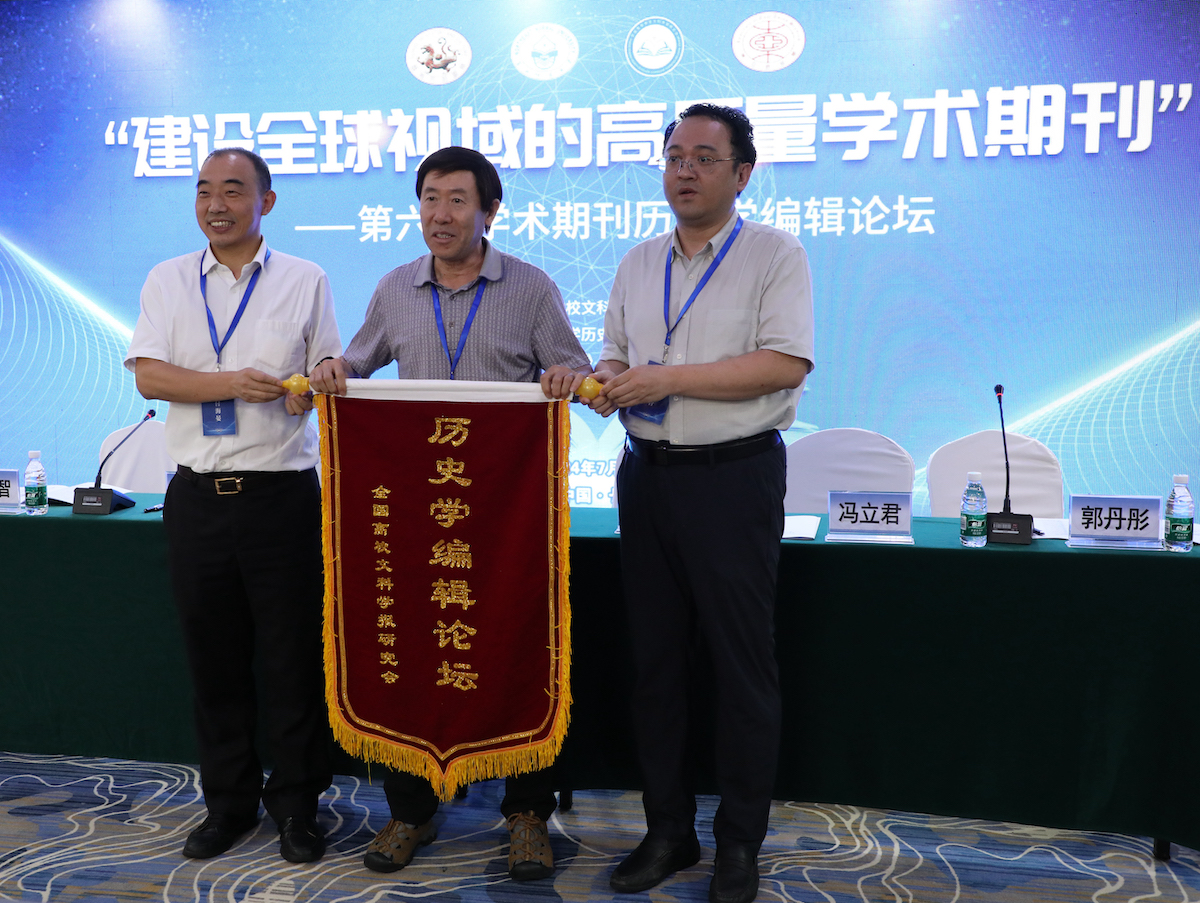
Flag handover ceremony
The closing ceremony of the meeting was presided over by Professor Guo Dantong, and Professor Feng Lijun, Professor Zhang Zhidong, Editor Zheng Guangchao and Professor Zhao Wenduo made summary reports on behalf of each unit respectively. Vice Chairman Liu Wenshan handed over the flag with the next organizer, Journal of Huazhong Normal University (Humanities and Social Sciences Edition). Professor HanDong Yu, editor-in-chief of Foreign Studies, School of History and Culture of Northeast Normal University, and Professor Zhong Weimin, vice chairman of the National College Journal of Liberal Arts, delivered closing speeches. Focusing on practical problems and academic frontiers, Han Dongyu pointed out the great responsibility of academic journals, and encouraged historians in various fields to strengthen exchanges and work together to promote the prosperity and development of history in the new era. Zhong Weimin expressed his gratitude to Northeast Normal University and all the experts and scholars attending the meeting. While celebrating the successful conclusion of this forum, he also placed hopes on the convening of the next forum. At the conclusion of the conference, Guo Dantong pointed out that this forum has conducted extensive and in-depth discussions on the theme of innovation and development of historical journals. Experts and scholars have contributed their insights and valuable experience, forming an academic consensus and pointing out the direction for the development of historical journals. In the future work, historical journals will continue to adhere to academic quality, pay attention to content depth and originality, and actively explore new paths of digital transformation of historical journals, and constantly innovate, so as to contribute to the construction of the three major systems of China history and the community of human destiny.